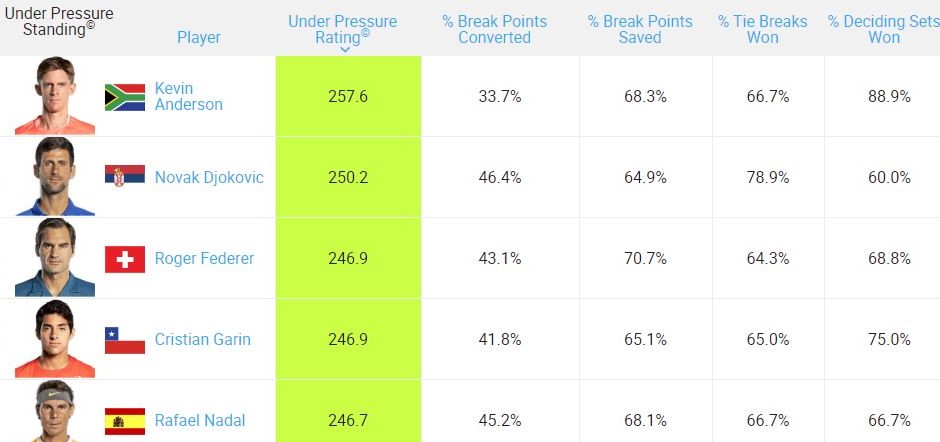Pressure points

Whether it is serving for the match, saving match point or playing someone you think you should beat, tennis can be stressful. So what is the best way to cope with the pressure?
Copying with pressure is so important in tennis, it is one of three keys stats the ATP monitors in the male pros. As well as success in serving and returning, it looks at who copes best the high pressure moments of break points, tie breaks and deciding sets. Top of the Under Pressure leaderboard is Kevin Anderson followed, unsurprisingly, by Novak Djokovic and Roger Federer.

Source: ATP Tour Stats Leaderboard
All the pros, no doubt, have help. "Psychologists have a lot to say about how to cope under pressure," according to the British Psychology Society's (BPS) newsletter. "Both the chronic kind, which might involve ongoing high expectations at work, for example; and the acute, single-event variety such as a vital meeting, a make-or-break presentation or a sports match."
Here according to the latest reserch are some of the ways to cope.
- Decide to change the way you think about stress. Instead of assuming it's debilitating, think of it as something you can benefit from. So in a match, if you see an overhead coming towards you, think 'lovely lob', not 'I hate overheads'.
- This type of positive stress mindset, according to a new study, is also associated with being proactive: it makes people more likely to plan to meet the challenge, to feel energerised at the end of the day and to look for feedback.
- Watch a horror film. Strange as it may seem, "deliberately scaring ourselves can calm the brain, leading to a 'recalibration of our emotions'," says the BPS.
- Big yourself up. "Anytime you have low expectations for performance, you tend to sink down and meet those low expectations,” says Sonia Kang from the University of Toronto who studied performance where people had 'low power' or little control of the outcome. “Self-affirmation is a way to neutralize that threat.”
- Don't indulge in self-deprecating humour. It is associated with more distress. Warwinka's tattoo, ("Ever tried. Ever failed. No matter. Try again. Fail again. Fail better") may raise a smile but the way Federer always talks up his performance after every match may be more effective.
- Get your partner to send you a text before or during the match. It does not have to give advice and may even be better if it doesn't. The important thing is to be remdined that someone really cares about you.
- Take a placebo. The reasons placebos work are complex and baffling but in a study of university students approaching end of term exams they significantly reduced their anxiety by taking a placebo, even though they knew it contained no active substances. It seems just knowing about the positive benefits of placebos can be enough to get some benefit. You'll need to find something plausible for you - it could be eating a banana (which might also help your energy levels) or a vitamin pill.
- Understand what you are up against. A 2017 study of elite tennis performance found men were twice as badly affected by stress as women and 'compelling' evidence that women can respond better than men to competitive pressure. But it can depend who you are playing. Women sometimes perform less well against men as men respond more favourably to competition. Perhaps it is a level playing field after all.
